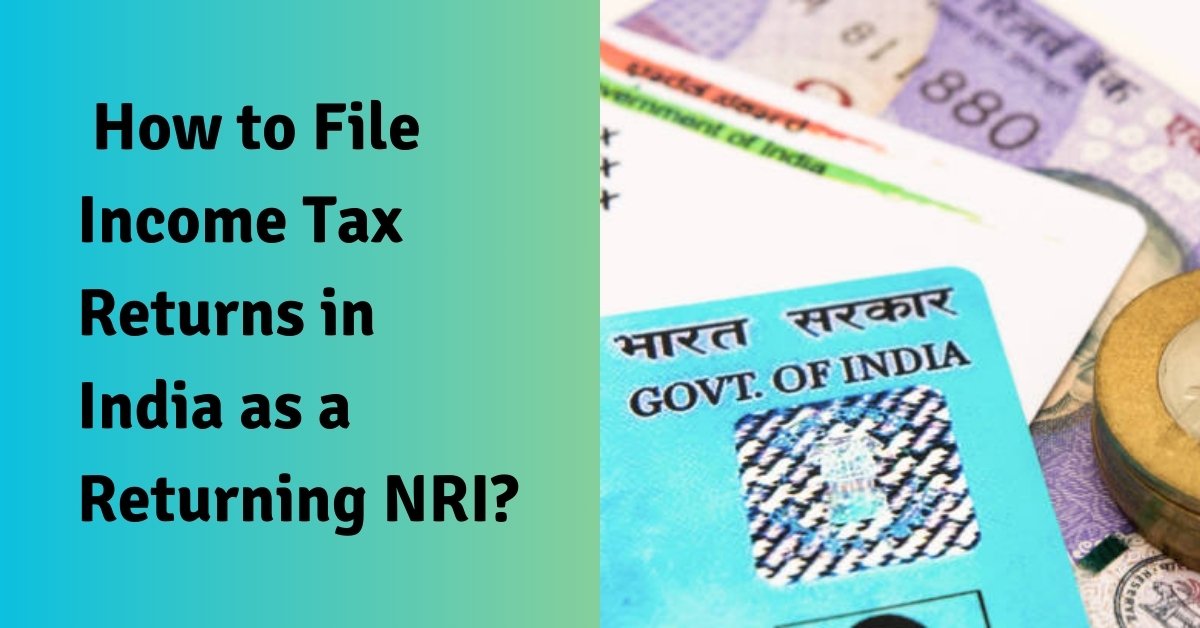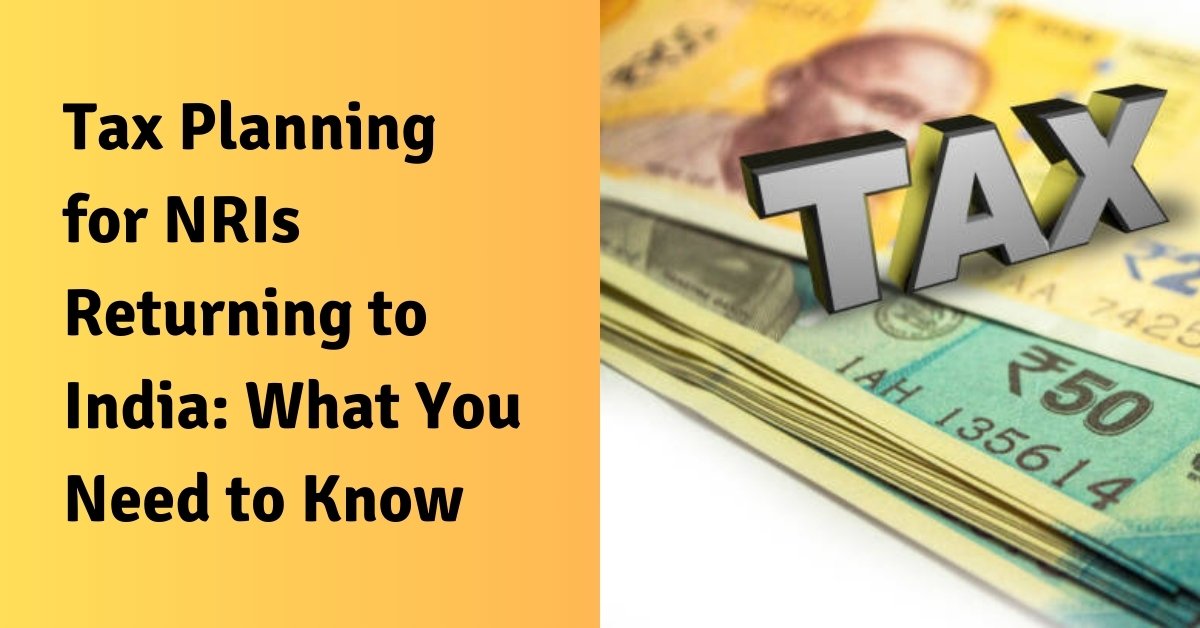Double Taxation Avoidance Agreements: What Returning NRIs Should Know?
As a Non-Resident Indian (NRI) planning to return to India, it is crucial to understand the concept of Double Taxation Avoidance Agreements (DTAAs) and how they impact your tax liabilities. DTAAs are bilateral treaties signed between India and other countries to prevent the double taxation of income and promote economic cooperation. In this blog post, we will delve into the key aspects of DTAAs and what returning NRIs should know to navigate their tax obligations effectively. Understanding Double Taxation: Double taxation occurs when the same income is taxed in two different countries. For example, if you are an NRI earning income in a foreign country and that income is also taxed in India, you may be subjected to double taxation. DTAAs aim to eliminate or mitigate this burden by allocating taxing rights between the countries involved. Purpose of DTAAs: The primary objectives of DTAAs are: a) To avoid double taxation and provide relief to taxpayers. b) To prevent fiscal evasion and ensure the exchange of information between countries. c) To promote cross-border trade and investment by providing certainty and stability in tax treatment. d) To allocate taxing rights between the country of residence and the country of source. How DTAAs Work? Under a DTAA, the country of residence (where the taxpayer resides) and the country of source (where the income originates) agree on the taxing rights for different types of income. The agreement specifies which country has the right to tax the income and to what extent. DTAAs provide relief from double taxation through various methods, such as exemption, credit, or reduced tax rates. Residency Determination: DTAAs lay down the criteria for determining the residency of a taxpayer. Generally, the country where the individual has a permanent home, center of vital interests, or habitual abode is considered the country of residence. In case of dual residency, the DTAA provides tie-breaker rules to determine the country of residence for tax purposes. Types of Income Covered: DTAAs cover various types of income, including: a) Employment income b) Business profits c) Dividend income d) Interest income e) Royalties and technical fees f) Capital gains g) Independent personal services h) Dependent personal services i) Pensions and annuities Each type of income is subject to specific rules and provisions under the DTAA. Claiming DTAA Benefits: To avail the benefits of a DTAA, returning NRIs must fulfill certain requirements: a) Obtain a Tax Residency Certificate (TRC) from the country of residence. b) Provide a self-declaration in Form 10F, confirming the eligibility for DTAA benefits. c) Submit the necessary documents and declarations to the Indian tax authorities. d) Disclose foreign income and claim foreign tax credit, if applicable, in the Indian income tax return. It is advisable to seek the assistance of a qualified tax professional to ensure compliance with DTAA provisions and claim the benefits correctly. Foreign Tax Credit: DTAAs provide relief from double taxation through the mechanism of foreign tax credit. If you have paid taxes on your foreign income in the country of source, you can claim a credit for those taxes against your Indian tax liability. The foreign tax credit is subject to certain conditions and limitations specified in the DTAA and the Indian Income Tax Act. Non-Discrimination Clause: Most DTAAs include a non-discrimination clause that ensures that the nationals of one country are not subjected to more burdensome taxation in the other country compared to its own nationals in similar circumstances. This clause promotes fairness and equality in tax treatment. Exchange of Information: DTAAs facilitate the exchange of information between tax authorities of the contracting countries. This helps in preventing tax evasion and ensuring compliance with tax laws. The exchange of information can be automatic, spontaneous, or on request, depending on the provisions of the specific DTAA. Seeking Professional Guidance: Navigating the complexities of DTAAs and their interplay with domestic tax laws can be challenging for returning NRIs. It is highly recommended to seek the guidance of a qualified tax professional who specializes in international tax matters. They can help you understand the specific provisions of the DTAA, optimize your tax planning, and ensure compliance with tax regulations in both countries. In conclusion, Double Taxation Avoidance Agreements play a vital role in mitigating the burden of double taxation for returning NRIs. By understanding the key aspects of DTAAs, such as residency determination, types of income covered, claiming benefits, foreign tax credit, and exchange of information, NRIs can make informed decisions and effectively manage their tax obligations. Seeking professional guidance is crucial to ensure compliance and maximize the benefits available under DTAAs. Disclaimer: The information provided here is for educational and informational purposes only and should not be construed as financial, legal, or tax advice. Consult with a qualified professional before making any investment decisions. We do not accept any liability for errors or omissions in this information nor any direct, indirect, or consequential losses arising from its use. FAQs: 1. What is a Double Taxation Avoidance Agreement (DTAA)? Answer – A Double Taxation Avoidance Agreement (DTAA) is a bilateral treaty signed between India and another country to prevent the double taxation of income and promote economic cooperation. It aims to eliminate or mitigate the burden of double taxation by allocating taxing rights between the countries involved. 2. Why are DTAAs important for returning NRIs? Answer – DTAAs are important for returning NRIs because they help avoid double taxation on income earned in foreign countries. They provide relief through various methods such as exemption, credit, or reduced tax rates, ensuring that NRIs are not taxed twice on the same income. 3. How is residency determined under a DTAA? Answer – DTAAs lay down the criteria for determining the residency of a taxpayer. Generally, the country where the individual has a permanent home, center of vital interests, or habitual abode is considered the country of residence. In case of dual residency, the DTAA provides tie-breaker rules to determine the country of residence for tax purposes. 4. What types of income are covered under
Tax Benefits and Exemptions for NRIs Returning to India
As a Non-Resident Indian (NRI) planning to return to India, it is essential to be aware of the various tax benefits and exemptions available to you. These benefits can help you optimize your tax liabilities and make the most of your financial situation. In this blog post, we will explore the key tax benefits and exemptions that NRIs can avail upon returning to India. Residential Status and Tax Implications: Your residential status plays a crucial role in determining your tax obligations in India. If you qualify as a Resident but Not Ordinarily Resident (RNOR), you can enjoy certain tax benefits for a period of up to three years from the date of your return. As an RNOR, your foreign income is not taxable in India unless it is derived from a business controlled in or a profession set up in India. Exemption on Interest Income: One of the significant tax benefits for returning NRIs is the exemption on interest income earned from Non-Resident External (NRE) accounts and Foreign Currency Non-Resident (FCNR) deposits. The interest earned on these accounts is tax-free in India, providing a favorable opportunity to park your foreign currency funds. Capital Gains Exemption: Long-term capital gains arising from the sale of foreign assets acquired during your NRI period are exempt from tax in India. This exemption is available if the asset is sold within two years from the date of becoming a resident. However, it is important to note that if the capital gains are repatriated to India, they may be subject to tax in the country where the asset is located. Exemption on Foreign Retirement Accounts: If you have accumulated funds in foreign retirement accounts such as 401(k) or Individual Retirement Accounts (IRAs), you can claim an exemption on the withdrawal of these funds upon returning to India. The exemption is available if the withdrawal is made within two years from the date of becoming a resident. However, it is advisable to consult with a tax expert to understand the specific tax implications based on the Double Taxation Avoidance Agreement (DTAA) between India and the country where the retirement account is held. Deductions under Section 80C: As a resident taxpayer, you become eligible for deductions under Section 80C of the Income Tax Act. This section allows you to claim deductions up to Rs. 1.5 lakh for investments made in tax-saving instruments such as Public Provident Fund (PPF), National Pension System (NPS), Equity Linked Savings Scheme (ELSS), and life insurance premiums. These deductions can significantly reduce your taxable income. Deductions for Health Insurance: Under Section 80D of the Income Tax Act, you can claim deductions for health insurance premiums paid for yourself, your spouse, and your dependent children. The deduction limit is Rs. 25,000 for individuals below the age of 60 and Rs. 50,000 for senior citizens. Additionally, you can claim a deduction of up to Rs. 5,000 for preventive health check-ups. Exemption on Reinvestment of Capital Gains: If you have earned long-term capital gains from the sale of a residential property in India, you can claim an exemption under Section 54 of the Income Tax Act by reinvesting the gains in another residential property within the specified time frame. This exemption can help you save a significant amount of tax on your capital gains. Deductions for Charitable Donations: Section 80G of the Income Tax Act allows you to claim deductions for donations made to charitable organizations and specified funds. The deduction amount varies depending on the nature of the donation and the organization. By making charitable contributions, you can not only support worthy causes but also reduce your tax liability. Deductions for Education Loans: If you have taken an education loan for yourself, your spouse, or your children, you can claim a deduction under Section 80E of the Income Tax Act for the interest paid on the loan. This deduction is available for a maximum of 8 years, starting from the year in which you start repaying the loan. Seek Professional Guidance: Navigating the Indian tax system as a returning NRI can be complex, especially with the various benefits and exemptions available. It is highly recommended to seek the assistance of a qualified tax professional who can guide you through the process, help you optimize your tax planning, and ensure compliance with the latest tax regulations. In conclusion, NRIs returning to India have access to several tax benefits and exemptions that can significantly reduce their tax liabilities. From exemptions on interest income and capital gains to deductions for investments, health insurance, and education loans, these benefits provide a favorable tax environment for returning NRIs. By understanding and leveraging these benefits, you can make informed financial decisions and maximize your savings. Disclaimer: The information provided here is for educational and informational purposes only and should not be construed as financial, legal, or tax advice. Consult with a qualified professional before making any investment decisions. We do not accept any liability for errors or omissions in this information nor any direct, indirect, or consequential losses arising from its use.
How to File Income Tax Returns in India as a Returning NRI?
As a Non-Resident Indian (NRI) returning to India, it is crucial to understand the process of filing your income tax returns. Navigating the Indian tax system can be complex, especially when transitioning from NRI to resident status. In this blog post, we will guide you through the steps involved in filing your income tax returns as a returning NRI. Determine Your Residential Status: The first step is to determine your residential status for the relevant financial year. If you have stayed in India for 182 days or more in a financial year or 60 days or more in a financial year and 365 days or more in the preceding four financial years, you will be considered a resident for tax purposes. If you meet these criteria, you may be classified as a Resident and Ordinarily Resident (ROR) or a Resident but Not Ordinarily Resident (RNOR), depending on your stay in India in the previous years. Gather Necessary Documents: To file your income tax return, you will need to gather all the necessary documents. This includes: Choose the Appropriate ITR Form: Based on your income sources and residential status, you need to select the appropriate Income Tax Return (ITR) form. As a returning NRI, you may need to use one of the following forms: Calculate Your Total Income: Calculate your total income from all sources, including salary, house property, capital gains, business/profession, and other sources. If you have foreign income, you need to disclose it in your tax return. Depending on your residential status (ROR or RNOR), the taxability of your foreign income may vary. Claim Applicable Deductions and Exemptions: As a resident taxpayer, you are eligible for various deductions and exemptions under the Indian Income Tax Act. These include: Compute Your Tax Liability: Based on your total taxable income, calculate your tax liability as per the applicable tax slabs. Don’t forget to include any applicable surcharge and cess. Suppose you have paid taxes in a foreign country and India has a Double Taxation Avoidance Agreement (DTAA) with that country. In that case, you may be eligible for a foreign tax credit to avoid double taxation. File Your Income Tax Return: You can file your income tax return online through the Income Tax Department’s e-filing portal (https://www.incometax.gov.in/). Create an account, log in, and follow the step-by-step process to fill in the details from the ITR form. Verify the information provided, attach the necessary documents, and submit the return. Make sure to digitally sign the return using your Digital Signature Certificate (DSC) or Aadhaar-based e-signing. Verify Your Return: After submitting your return, you need to verify it within 120 days. You can verify your return electronically using Aadhaar OTP, net banking, or by sending a signed physical copy of ITR-V (acknowledgment) to the Central Processing Centre (CPC) in Bengaluru. Keep Track of Refunds or Demands: Once your return is processed, you will receive an intimation from the Income Tax Department regarding any refund or demand. If you are eligible for a refund, it will be credited to your registered bank account. In case of a demand, you need to pay the outstanding tax along with applicable interest. Filing income tax returns as a returning NRI requires careful planning and understanding of the Indian tax laws. It is advisable to seek the assistance of a qualified tax professional to ensure accurate and timely filing of your returns. Stay informed about the latest tax regulations and deadlines to avoid any penalties or legal consequences. Disclaimer: The information provided here is for educational and informational purposes only and should not be construed as financial, legal, or tax advice. Consult with a qualified professional before making any investment decisions. We do not accept any liability for errors or omissions in this information nor any direct, indirect, or consequential losses arising from its use.
Understanding the RNOR Status and Its Tax Implications
As a Non-Resident Indian (NRI) transitioning back to India, it is crucial to understand the concept of Resident but Not Ordinarily Resident (RNOR) status and its tax implications. The RNOR status serves as a bridge between the NRI status and the Resident and Ordinarily Resident (ROR) status. In this blog post, we will delve into the intricacies of the RNOR status and how it impacts your tax obligations. What is RNOR Status? The RNOR status is a residential status category under the Indian Income Tax Act. It applies to individuals who have been non-residents in India in 9 out of the 10 preceding financial years or have stayed in India for less than 730 days during the preceding 7 financial years. The RNOR status provides certain tax benefits and exemptions that are not available to ROR individuals. Conditions for RNOR Status: To qualify for RNOR status, you must satisfy one of the following conditions: Taxation of Income for RNOR As an RNOR, your tax liabilities are as follows: This means that as an RNOR, you have the advantage of not being taxed on your foreign income unless it is derived from a business controlled in or a profession set up in India. Exemptions for RNOR: As an RNOR, you are eligible for certain exemptions that are not available to ROR individuals: These exemptions provide significant tax benefits to RNORs, allowing them to manage their foreign income and assets more efficiently. Duration of RNOR Status: The RNOR status is valid for a maximum of two consecutive financial years. After that, if you continue to meet the residency criteria, you will be classified as an ROR, and your global income will become taxable in India. Importance of Tax Planning: As an NRI transitioning to RNOR status, it is essential to engage in tax planning to optimize your tax liabilities. This involves: Seeking the guidance of a qualified tax professional can help you navigate the complexities of RNOR status and ensure compliance with tax regulations. Transition to ROR Status: After the expiry of the RNOR status, you will be classified as an ROR if you satisfy the residency criteria. As an ROR, your global income becomes taxable in India, and you will be subject to the same tax rules as other resident individuals. It is crucial to plan ahead and adjust your financial strategies accordingly to minimize your tax liabilities. In conclusion, understanding the RNOR status and its tax implications is vital for NRIs returning to India. By leveraging the benefits of RNOR status, such as exemptions on foreign income and capital gains, you can optimize your tax position. However, proper tax planning and seeking professional advice from NRI Tax advisors are essential to ensure compliance and make informed financial decisions. Disclaimer: The information provided here is for educational and informational purposes only and should not be construed as financial, legal, or tax advice. Consult with a qualified professional before making any investment decisions. We do not accept any liability for errors or omissions in this information nor any direct, indirect, or consequential losses arising from its use. FAQs: 1. Q: Who is eligible for RNOR status? A: An individual is eligible for RNOR status if they have been an NRI in 9 out of the 10 previous financial years preceding the relevant financial year or have stayed in India for less than 730 days during the 7 financial years preceding the relevant financial year. 2. Q: How long can one maintain RNOR status? A: The RNOR status is valid for a maximum of two consecutive financial years. After that, if the individual continues to meet the residency criteria, they will be classified as a Resident and Ordinarily Resident (ROR). 3. Q: What are the tax implications of RNOR status? A: As an RNOR, income received or deemed to be received in India, income accruing or arising in India, and income accruing or arising outside India from a business controlled in or a profession set up in India are taxable. However, income accruing or arising outside India (other than income from a business controlled in or a profession set up in India) is not taxable unless it is derived from a business controlled in or a profession set up in India. 4. Q: Are there any tax exemptions available for RNORs? A: Yes, RNORs are eligible for certain tax exemptions. Interest income earned from NRE and FCNR accounts is exempt from tax. Foreign income, including salary, pension, and other sources of income, is not taxable in India unless it is derived from a business controlled in or a profession set up in India. Capital gains from the transfer of foreign assets acquired during the NRI period are also not taxable in India. 5. Q: How can one optimize their tax position as an RNOR? A: To optimize your tax position as an RNOR, you should engage in tax planning. This involves timing your return to India strategically, structuring your foreign income and investments to minimize tax implications, utilizing tax deductions and exemptions available to RNORs, and maintaining proper documentation and records of your foreign income and assets. 6. Q: Is it necessary to seek professional advice for tax planning as an RNOR? A: Yes, it is highly recommended to seek the guidance of a qualified tax professional when planning your taxes as an RNOR. They can help you navigate the complexities of RNOR status, optimize your tax strategies, and ensure compliance with tax regulations. 7. Q: What happens after the expiry of RNOR status? A: After the expiry of the RNOR status, if you continue to meet the residency criteria, you will be classified as an ROR. As an ROR, your global income becomes taxable in India, and you will be subject to the same tax rules as other resident individuals. 8. Q: Can an RNOR claim tax treaty benefits? A: Yes, an RNOR can claim tax treaty benefits under the Double Taxation Avoidance Agreement (DTAA) between India and the country where
Tax Planning for NRIs Returning to India: What You Need to Know?
As a Non-Resident Indian (NRI) planning to return to India, it is crucial to understand the tax implications and strategies to ensure a smooth transition. Proper tax planning can help you optimize your finances and avoid any unnecessary tax liabilities. In this blog post, we will delve into the essential aspects of tax planning for NRIs returning to India. Residential Status: Your residential status plays a significant role in determining your tax obligations in India. As per the Indian Income Tax Act, if you stay in India for 182 days or more in a financial year or 60 days or more in a financial year and 365 days or more in the preceding four financial years, you will be considered a resident for tax purposes. It is essential to plan your return date accordingly to avoid any unintended tax consequences. Taxation of Income: Once you become a resident, your global income will be subject to taxation in India. This includes income from salary, business profits, capital gains, and other sources. However, if you have paid taxes on your foreign income in the country of origin, you may be eligible for a foreign tax credit in India to avoid double taxation. It is advisable to consult with a tax expert to understand the specific tax implications based on your income sources and the Double Taxation Avoidance Agreement (DTAA) between India and the country where you earned the income. Asset Declaration: As an NRI returning to India, you are required to declare your foreign assets and income in your Indian tax return. This includes bank accounts, investments, immovable properties, and any other assets held outside India. Failure to disclose such assets can lead to penalties and legal consequences. It is crucial to maintain proper documentation and seek professional guidance to ensure compliance with the asset declaration requirements. NRE and NRO Accounts: If you have Non-Resident External (NRE) and Non-Resident Ordinary (NRO) accounts, it is important to understand the tax treatment of these accounts upon your return. The balances in your NRE account can be repatriated tax-free, while the interest earned on NRO accounts is taxable. You may need to convert your NRE account to a resident account and your NRO account to a resident savings account within a specified timeframe after becoming a resident. Capital Gains: If you have investments in India or abroad, it is essential to consider the capital gains tax implications. Long-term capital gains from the sale of equity shares and equity-oriented mutual funds are taxed at a concessional rate of 10% (without indexation) if the gains exceed Rs. 1 lakh. Short-term capital gains from such investments are taxed at a rate of 15%. For other assets, such as immovable property or debt mutual funds, the tax rates vary based on the holding period and the nature of the asset. Proper planning and timing of investment decisions can help optimize your tax liability. Retirement Planning: Suppose you have accumulated funds in foreign retirement accounts, such as a 401(k) or an Individual Retirement Account (IRA). In that case, you need to consider the tax implications of bringing those funds to India. The taxation of such funds depends on the DTAA between India and the country where the retirement account is held. It is advisable to seek professional guidance to explore options such as maintaining the foreign retirement account or transferring the funds to a recognized Indian retirement scheme. Tax Deductions and Exemptions: As a resident, you become eligible for various tax deductions and exemptions available under the Indian Income Tax Act. These include deductions for investments in tax-saving instruments like Public Provident Fund (PPF), National Pension System (NPS), and life insurance premiums. Familiarizing yourself with these deductions and planning your investments accordingly can help reduce your tax liability. Advance Tax Payments: If your estimated tax liability exceeds Rs. 10,000 in a financial year, you are required to pay advance tax in installments. Failure to pay advance tax or paying an insufficient amount can result in interest charges. It is crucial to estimate your tax liability accurately and plan your advance tax payments to avoid any penalties. Professional Assistance: Given the complexity of tax laws and the unique circumstances of NRIs returning to India, it is highly recommended to seek the assistance of a qualified tax professional. They can help you navigate the tax landscape, optimize your tax planning strategies, and ensure compliance with the latest tax regulations. In conclusion, tax planning for NRIs returning to India involves various considerations, including residential status, taxation of income, asset declaration, investment planning, and retirement planning. By proactively addressing these aspects and seeking professional guidance from NRI Tax consultants, you can minimize your tax liabilities and ensure a smooth financial transition as you return to India. Disclaimer: The information provided here is for educational and informational purposes only and should not be construed as financial, legal, or tax advice. Consult with a qualified professional before making any investment decisions. We do not accept any liability for errors or omissions in this information nor any direct, indirect, or consequential losses arising from its use. FAQs 1. How is my residential status determined for tax purposes when I return to India? Ans – Your residential status is determined based on the number of days you stay in India during a financial year. If you stay in India for 182 days or more in a financial year or 60 days or more in a financial year and 365 days or more in the preceding four financial years, you will be considered a resident for tax purposes. 2. Will my global income be taxed in India once I become a resident? Ans – Yes, once you become a resident, your global income, including income from salary, business profits, capital gains, and other sources, will be subject to taxation in India. However, you may be eligible for foreign tax credits if you have paid taxes on your foreign income in the country of origin. 3. Do I need
Understanding Property Tax Implications for Returning NRIs
As a Non-Resident Indian (NRI), you may have invested in property in India while living abroad. However, when you decide to return to India, it’s important to understand the property tax implications that come with this move. In this blog post, we’ll explore the key aspects of property taxation for returning NRIs, helping you navigate the financial landscape more effectively. Residential Status and Tax Liability Your residential status plays a crucial role in determining your tax liability in India. As an NRI, you are considered a non-resident for tax purposes if you meet either of the following conditions: – You have been outside India for 182 days or more during the financial year, or – You have been outside India for 365 days or more during the four preceding financial years and 60 days or more in the current financial year. When you return to India and no longer meet these conditions, you become a resident for tax purposes. This change in residential status has a significant impact on your property tax obligations. Taxation of Rental Income If you have been earning rental income from your property in India while living abroad, you must report this income and pay taxes accordingly. As a returning NRI, your rental income will be taxed as per the applicable tax slab rates. You can claim a standard deduction of 30% from the net annual value of the property for repair and maintenance expenses. Additionally, you can claim deductions for municipal taxes paid and interest paid on any home loan associated with the property. Capital Gains Tax When you sell your property in India, you may be liable for capital gains tax. The tax treatment depends on the duration for which you held the property before selling it. If you sell the property within two years of purchase, the gains are considered short-term capital gains and are taxed as per your income tax slab rates. On the other hand, if you sell the property after two years, the gains are treated as long-term capital gains and are taxed at 20% with indexation benefits. Indexation allows you to adjust the purchase price of the property to account for inflation, reducing your tax liability. It’s important to note that as a returning NRI, you may be eligible for certain exemptions and deductions on capital gains tax, such as reinvesting the gains in another property or bonds. Tax Deducted at Source (TDS) When you sell a property in India, the buyer is required to deduct a certain percentage of the sale consideration as TDS and deposit it with the government. As a returning NRI, you need to be aware of these TDS provisions. If the sale consideration exceeds Rs. 50 lakhs, the buyer must deduct 1% of the amount as TDS. It is your responsibility to ensure that the TDS is deducted correctly and reflected in your tax returns. Inherited Property If you have inherited a property in India as an NRI and are now returning, you should understand the tax implications. If the property is inherited from a specified relative, such as a parent, spouse, or sibling, there is no tax liability. However, if the property is inherited from any other person, you may be subject to tax based on the market value of the property as of the date of inheritance. Wealth Tax Before April 1, 2015, wealth tax applied to the aggregate value of specified assets, including immovable property. However, wealth tax has been abolished in India, and you are no longer required to pay this tax on your property holdings. Conclusion – As a returning NRI, it’s crucial to familiarize yourself with the property tax implications in India. From rental income taxation to capital gains tax and TDS provisions, understanding these aspects will help you make informed decisions and fulfill your tax obligations. Seek the guidance of a qualified tax professional to ensure compliance with the latest tax laws and regulations. Disclaimer: The information provided here is for educational and informational purposes only and should not be construed as financial, legal, or tax advice. Consult with a qualified professional before making any investment decisions. We do not accept any liability for errors or omissions in this information nor any direct, indirect, or consequential losses arising from its use. FAQs 1. What happens to my NRI status when I return to India? Ans – When you return to India and stay for more than 182 days in a financial year, you become a resident for tax purposes. This change in residential status affects your property tax liabilities. 2. How is rental income from my property taxed as a returning NRI? Ans – As a returning NRI, your rental income is taxed as per the applicable tax slab rates. You can claim a standard deduction of 30% from the net annual value of the property for repair and maintenance expenses, along with deductions for municipal taxes and home loan interest. 3. What is the capital gains tax implication when I sell my property after returning to India? Ans – If you sell your property within two years of purchase, the gains are considered short-term and taxed as per your income tax slab rates. If you sell after two years, the gains are treated as long-term and taxed at 20% with indexation benefits. 4. Can I claim exemptions on capital gains tax as a returning NRI? Ans – Yes, as a returning NRI, you may be eligible for certain exemptions and deductions on capital gains tax, such as reinvesting the gains in another property or bonds. Consult with a tax professional to understand your options. 5. What is Tax Deducted at Source (TDS) on property sale, and how does it affect me? Ans – When you sell a property exceeding Rs. 50 lakhs, the buyer must deduct 1% of the sale consideration as TDS and deposit it with the government. Ensure that the TDS is deducted correctly and reflected in your tax returns. 6. How is







